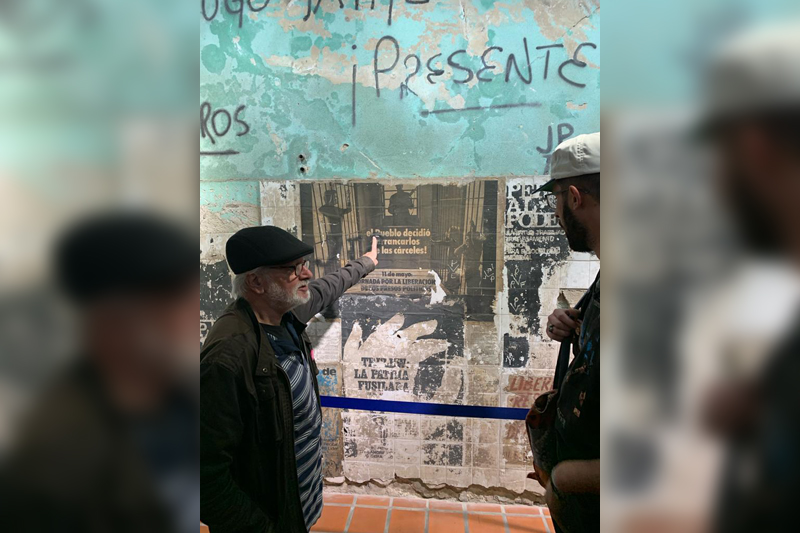
Read time:
Learning about a country’s history and culture in a classroom can be insightful. But being on the ground, in the place where the events happened, can elevate students’ understanding in a way that offers different perspectives and fresh interpretations.
Just ask Henry Sergent and Alyssa Dickerson, who after doing an independent study course with Dr. Rocio Gordon, associate professor in the Department of Modern and Classical Languages and Literatures, traveled with her to Buenos Aires, Argentina. Their goal was to further their studies and see for themselves what they had been researching at Christopher Newport. Both students looked at very different aspects of the last Argentinian dictatorship.
“This trip was life changing for me,” said Dickerson.
The class Dickerson and Sergent took with Gordon before heading to Argentina was called, “Memory and Justice: Argentinian Dictatorship and Urban Re-Appropriations.” The class looked at the political, social and cultural history that led to the Argentinian dictatorship.
Sergent and Dickerson each delved into different aspects of the subject. Sergent focused on street art in Argentina and how it related to the city’s collective memory of the past and its attitudes toward the present.
Dickerson, ‘24 Spanish, turned her sights on investigating the history and impact of memorial sites in Argentina that are linked to state terrorism that occurred during the last dictatorship. She sought to determine how the sites were established, and how they commemorate the Argentinian citizens that were killed or tortured during the dictatorship, and the ways in which they contribute to transitional justice.
“Rather than just reading about the sites in books or online, I also wanted to be able to visit some of them in person and get the full experience, Dickerson said. “I thoroughly enjoyed every memorial site we went to and learned so much. It is amazing to be able to see these places firsthand when I have been learning about them for so long.”
Sergent, ‘24 Communication, agreed.
“I feel like my perspective has been broadened in a way that only going abroad or somewhere new can do,” he said. “Not only did I get to meet a new range of people, and get involved with contemporary issues in Buenos Aires, but I was able to tap into the emotions of the city through looking at their street art. I feel like this project has introduced me to a line of artistic inquiry that I’d like to dig deeper into.”
Sergent’s research focused on examining street art and showing the similarities and differences in attitudes expressed through street art throughout the city.
“Different neighborhoods have varying intensities of political imagery in their street art based on that area’s socioeconomic status,” he said. “Richer neighborhoods have more beautifying street art and poorer neighborhoods are more politically charged.”
Both Dickerson and Sergent plan to apply what they learned in Argentina to their future endeavors.
Sergent, who has a clothing brand he sells online, hopes to use the street art he saw in Argentina to influence his clothing designs.
“I want to continue traveling and studying and pulling inspiration from street art throughout the world. I make wearable art with my painted clothing and in my mind it is kind of graffiti because I am taking personalized artwork into the public domain through the vehicle of whoever is wearing my clothing,” hes said. “I took a lot of inspiration from the street art in Argentina and I think more exploration would only continue to bolster the meaning and aesthetic of my work.”
Dickerson, who plans to pursue a Master of Art in Teaching at CNU after she graduates, said that she will infuse her Argentinian experience into her teaching.
“I would really like to make sure I am incorporating a lot of history lessons in my teaching,” she said. “The trip and project really taught me a lot about how important it is to educate future generations currently and it is part of my responsibility to do so.”